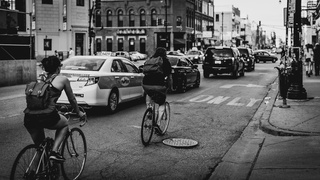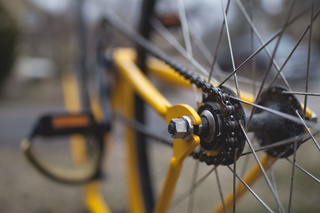
Delivery services are making people’s everyday lives easier all the time. Clients expect their dinner to be warm, or their shopping cold and fresh, whenever it reaches their front door. The next time you irritably open the front door as the waiting time turns out to be slightly longer than promised, however, take a moment to remember just how hard the job of a bicycle courier really is. On the contrary, in fact. While the young delivery service companies are making money hand-over-fist, the riders themselves are out risking their lives in city traffic, for a wage of around 10 euros an hour. Their everyday work is a uniquely stressful battle against time.
FOR THE LOVE OF BIKES?
We all know the situation: it’s Sunday evening, and you just haven’t got the energy to get off the sofa and cook. Luckily, all it takes to save the day are a couple of clicks for a pizza to be delivered to the front door within minutes. It would be hard to imagine our everyday lives nowadays without a role for bike-based delivery services from time to time. Behind that freshly-delivered face, however, lies an inhuman business system, guided by algorithms and designed purely to exploit the employees of the delivery services. As if that were not enough, the job of the so-called “riders” is also extremely dangerous. Thanks to the acute time-pressure of the deliveries, they run a high risk of being caught up in road accidents. In August 2021, a Lieferando rider was clipped by an SUV, later dying in hospital.
Delivery companies have been popping up wherever you look in recent years. In Austria, the best-known of these newcomers by far is Lieferando. By buying up smaller delivery companies, the company has created a monopoly for itself in numerous areas. Newer to Austrian cities, meanwhile, is the company Flink, which pledges to get food to its destination quickly without any price mark-up. Meanwhile, the delivery service Gorillas, already a common sight on German streets, boasts of being able to deliver supermarket goods to your door within just ten minutes.

During the covid-19 pandemic and multiple lockdowns, the sector, which was booming already, became even more lucrative. The companies embody an urbane, hip attitude to life, a look and feel they place centre-stage when advertising for new staff. Even the pleasure of riding a bike in the city is celebrated in the ads.
A HARD DAY’S RIDE
But what does reality actually look like for the bicycle couriers working at these companies? In a recent reportage, Andrea Brack-Peña decided to give it a try herself and find out, working as a Lieferando rider for three weeks to see whether the rumours of bad working conditions there were true. Her conclusion: the job is really – really – hard. “If you want to get there on time and see any money, then you can’t actually afford for anything to go wrong”, she says.
Your most indispensable tool, of course, is your smartphone. When it comes to this, employees have to use their private phone, and even use up their own mobile data. Most will be using their own bike, too. You have to pay for any repairs yourself, getting just a small wear-and-tear package in the form of an Amazon voucher – certainly at Lieferando, reporter Brack-Peña says from personal experience. In the three weeks she worked for Lieferando, she had just one accident herself (relatively minor, luckily), after which her bike needed repairing. The reporter points to the constant time-pressure staff are under. The app informs the riders of the time by which the food is supposed to be with the client. If the restaurant doesn’t distribute meals on time, the rider is immediately behind, and forced to make up for it themselves by travelling the city streets even more quickly.
THE ALGORITHM – A HEARTLESS TASKMASTER
Before starting a shift as a rider, you need first to log into the system via the app on your smartphone. Digital politician Yannick Haan believes the riders at delivery services are deliberately being driven into loneliness. They are given the feeling they are completely on their own. The jobs of the riders are decided completely by an algorithm. The riders are sent to the restaurant by their smartphone, and subsequently to the client. The app navigates during the journey, recording absolutely every movement made. As a result, it can also measure the speed the riders are travelling at. In other words, they are subjected to constant monitoring at all times.
FREELANCING AND PERSONAL RISK
Since 2020, a collective agreement has been in place for bicycle couriers in Austria, a major milestone. These employees can count themselves lucky; when in fixed employment, they get to enjoy a minimum wage of €1,500 a month, holiday and Christmas pay, and reimbursement of costs associated with their private smartphones and bikes. The Chamber of Commerce knows, however, that even a fixed position like this usually has a sting in the tail: contractually-determined standby duty. This standby duty should be specially remunerated, in fact, but this is often not the case.
At Mjam, for example, riders are self-employed – freelancers, in other words. That means they have no insurance if they are ill, for instance. If you’re too ill to work, you just don’t get paid – it’s as simple as that.
THE WEAKEST LINK

The business model employed by the delivery services is exploitative. The companies are supposed to grow artificially quickly, and increase in value, which is why the managers invest such huge amounts of money in image campaigns. Rather than building up the company in the normal way, however, the aim is to achieve high profits, quickly. The riders see absolutely none of this. On the contrary, in fact; without their low wages, such rapid growth simply wouldn’t be possible. Stefan Sell, Professor of Political Economy and Social Education, regrets the fact that in a “hyper-growth strategy” of this nature, the employees at the very end of the food chain end up being victims. The digital economy is a business model in which millions are being invested, while at the other end, the employees themselves are forced to haggle over small change.
SO WHY IS THE JOB SO POPULAR?
So if the riders’ everyday lives are so tough, and they don’t even get paid well for doing it, why do so many young people decide to work for Lieferando, Mjam and Co.? The job is perfect for students, of course, thanks to the high level of flexibility it offers. As a result, fluctuation is high in the industry, with staff constantly coming and going. There are also those, however, who have little alternative but to take a low-level job such as this. The work done by the bicycle couriers requires no special training or prior knowledge, as well as little to no German skills. As well as this, many people who were formerly employed in the gastronomy sector and lost their job during the pandemic have ended up working for delivery services. The companies make full use of exactly these existential uncertainties. Quite simply, many riders have no perspective of getting a better-paid, less risky job. Many who work at online delivery services belong to the so-called “working poor”, that is people who work full-time, but still don’t earn enough money to live on.
DEMAND FOR BETTER WORKING CONDITIONS
On the one hand, the reason why working conditions are improving quite so slowly is the high level of fluctuation; people only doing the job temporarily just don’t think it’s worth their while rocking the boat. On the other hand, however, some fear for their job, and with good reason. Last year, when a few bicycle couriers at the “Gorilla” delivery service, popular in Germany, went on strike, a number of them were immediately sacked. The reason given for doing this was that the strikes had not been registered, and were not supported by the union, and so were illegal.
Despite this (still only moderate) organisation, bicycle couriers do actually have a number of achievements to celebrate. As mentioned above, a collective agreement has been in place for the riders since 2020, and their union, vida, has succeeded in negotiating a 50-percent pay-rise for working on Sunday. Sometimes it’s really just the little things the riders are looking for, like suitable winter gear and a restriction on working hours during extreme weather conditions.
Even if improvements are steadily being made, it is still difficult for riders to found unions and fight for their rights. Experts believe it is time to define European guidelines for the regulation of online platform work.

Whether it’s ethically correct at all to order via Lieferando and the like in light of these working conditions is another question entirely. Either way, you should certainly be aware of the everyday trials and tribulations faced by riders, and show understanding the next time you have to wait a minute or two longer than expected for your dinner. A decent tip is one way of expressing gratitude to the riders, and showing you value their service. And as time goes by, it can only be hoped that the riders’ protests will bear fruit, and improvements to their working conditions continue to be achieved.
Translation by Tim Martinz-Lywood, European Exchange Ltd.
www.european-exchange.co.uk
#DeliveryServices #Rider #BikeCouriers #BikeMessenger #WorkingConditions #againsthumantrafficking #gegenmenschenhandel #endexploitation #endtrafficking #hopeforthefuture
